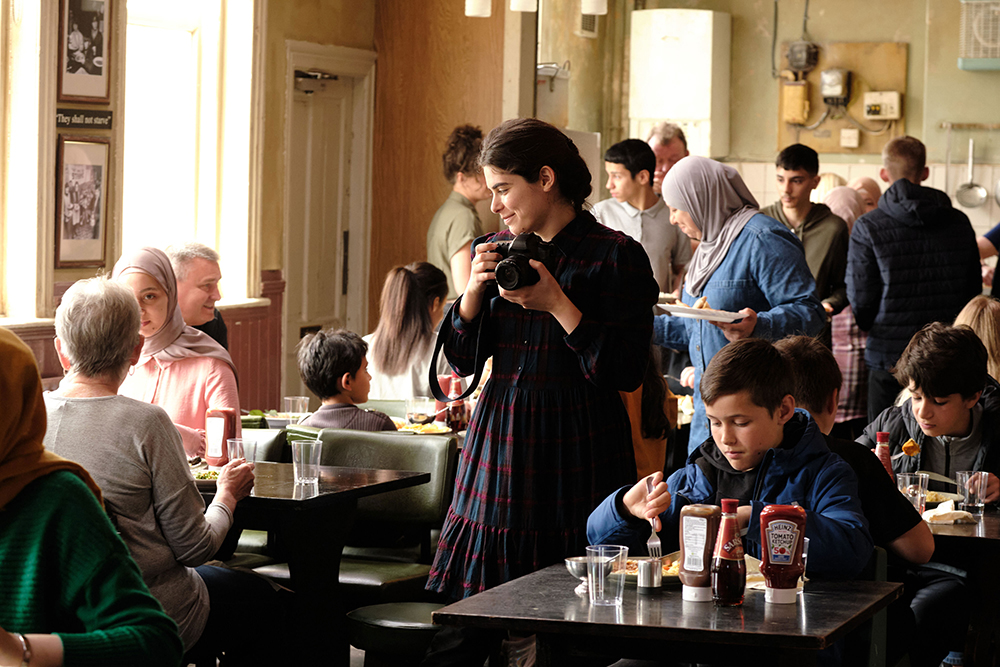Meeting new Loach, it’s same as the old Loach, and “The Old Oak” tips its hat not just to his recent films—the searing “Sorry We Missed You” (2019) and Palme d’Or winner “I, Daniel Blake” (2016)—but also, “Kes” (1968), the first international triumph which announced a singular cinematic voice, joining wounded humans who are cruel to each other with a beatific animal which offers a shot at redemption. Loach and Laverty lay it on thick, as if to assure viewers that this is, we promise, the final film, so buckle up. Taboo topics strike like lighting and, viewed as the content of one film, it tempts excess, but seen within the context of a late-career trilogy, “The Old Oak” is a striking, fully-realized statement in favor of solidarity.
Tension Simmers Before the First Frame
Whereas the main character in “Sorry” was the gig economy, and “Daniel” the U.K. health system’s grueling bureaucracy, the heartbeat of “The Old Oak” is County Durham. And for these Northeast England villagers, The Old Oak, the last pub standing, symbolizes the long, slow decline into obscurity for the town and its people. The locals gather at the pub to grouse and gripe with TJ (Dave Turner), whose family has owned the place for decades. His dad died in a mining accident, when mining was the local engine of economic growth. The people he sees everyday aren’t so much friends, but partners, all sharing a lifetime of memories of witnessing the downfall of the town where they lived and worked. Now, few of its older residents have any place to go—a job or otherwise—so they drink and whine in TJ’s company.
Before Loach’s camera even rolls, the tension simmers according to a series of snapshots flashing on-screen. During an afternoon when a busload of Syrian immigrants arrives, locals take to the streets to protest, deploying the usual racist verbiage (“Go back to where you came from!”) to signal displeasure. Turns out these still images came from the camera of Yara (Ebla Mari), the only member of her family who speaks English. She’s frightened yet defiant when Rocco (Neil Leiper), drunk and donning his favorite football team’s jersey, grabs hold of the camera and then drops it on the ground. Durham has a few good guys and gals—TJ among them—who speak up amid the chaos (“They’re just children!”), but the anti-welcome party sets a line in the sand, the ultimate us versus them.
A Survey of Trigger Warnings

When Yara visits TJ at the pub, she is appreciative for the support, but also demands that he help find Rocco, who ought to pay for her camera. Coy at first, TJ offers to trade in two older family cameras in order to fund the repair of Yara’s, and he delivers it (“It’s brand new!”) to Yara’s home. There he learns that Yara’s father is missing, and her mother and three siblings articulate—through Yara’s translation—their appreciation and struggle. Back at the pub, Charlie (Trevor Fox) rallies his pals to hold a community meeting, but TJ shrugs off that advance with a mix of discomfort and technicalities (the back room isn’t insured). Meanwhile, Yara and Laura (Claire Rodgerson) convince TJ to use that room to serve food to families in need—Syrian and English—invoking TJ’s late mom’s motto that those who eat together, stay together.
That rallying cry falls on deaf ears among TJ’s bitter, badgering male customers. And following the horrific death of TJ’s beloved dog Marra, his tone has changed, reminding the town about when the mining workers’ strike in the 1980s brought everyone so close together. Yet, when word gets out that TJ favored Yara’s please over Charlie’s, that clique strikes back in the most sinister manner possible, leading TJ to reflect on his own personal tragedies, dating back from the day when he first found Marra on the beach, where he had planned to drown himself. The film barrels towards one final tragedy, an offscreen death of someone who doesn’t appear in the film, but whose invisibility represents the primary grievance that these discarded locals carry each day.
Hard, True-to-Life Storytelling
At the end, Loach allows for some reprieve, but it’s far from a cheery finale. It’s a service to the film and these people that he doesn’t put a bow on a sad story, because the ripped-from-the-headlines narrative is too familiar to be sanitized. All the backstories presented—both of the Syrian and English people—are hard to hear because they’re true to life, and the stark, direct storytelling is complemented by Robbie Ryan’s smooth, roaming camerawork. Pathos and optimism walk alongside each other in the final scenes, depicting a town that’s battered but never defeated, signaling toward the toll taken on the oppressed, who nearly cave but not quite under the unbearable heaviness of living.
“The Old Oak” is currently playing in theaters after an opening at the Film Forum.



